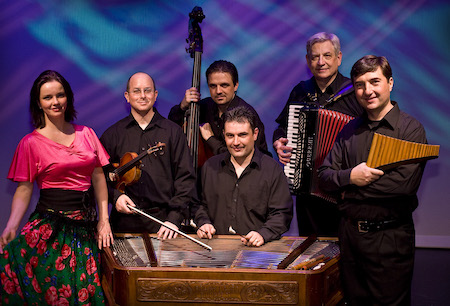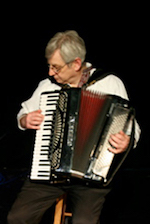by Jarrett Hoffman

This Friday, April 20 at 7:00 pm at John Knox Presbyterian Church in North Olmsted, the Church’s Performance Series will present the six-piece, Cleveland-based ensemble Harmonia. The program includes traditional Hungarian, Slovak, Ukrainian, Romanian, Croatian, and Gypsy folk music — the sounds of the players’ ancestry.
“Some of our musicians would never have been permitted to leave Europe prior to 1991, except possibly as refugees,” Mahovlich said. “But with the fall of the Berlin Wall, it became possible for people to leave. That certainly provided great opportunities for the West to hear some extraordinary players.”
The origins of Harmonia date back nearly 30 years ago, when Mahovlich — who grew up in Cleveland in a Croatian and Hungarian family — began to perform with violinist Steven Greenman. “I had been playing music from Eastern Europe and the Balkans semi-professionally, in the sense that I was doing it for money, since I was about 19,” Mahovlich said. He was thrilled to meet a violinist who shared an interest in that music. “Initially the idea was that we would play some parties.” Instead Harmonia has gone on to release six albums and tour the country, from Louisiana to Hawaii.
The group continued to build through chance conversations: one in a copy shop (“What kind of music are you copying?”), and one at an after-concert party where there happened to be a couple of cimbaloms (large hammered dulcimers from Eastern Europe). Sure enough, lurking around was a cimbalom player: Alexander Fedoriouk, who would play his first concert with Mahovlich a few months later. “We’ve been together ever since,” the accordionist said.
And as friendships often do, that one rippled into a second: Mahovlich became acquainted with Fedoriouk’s colleague Andrei Pidkivka, who now contributes his nai and sopilka (pan and shepherd’s flutes) to Harmonia. “I believe they knew each other back in Ukraine,” Mahovlich said, “but certainly from playing in the U.S.” Two natives of Eastern Slovakia round out Friday’s lineup: vocalist Beata Begeniova and the multi-talented Branislav Brinarsky — bassist and vocalist, and player of the fujara, a six-foot-long bass flute from Slovakia.
Friday’s program will span from traditional village music to urban, virtuosic music. “We think that whole range is valid folk music,” Mahovlich said. “It just happens that one is very virtuosic. Some folk musicians hold that stuff in contempt, calling it restaurant music, but we don’t see it that way at all.”

Another feature will be traditional folk tunes from Fedoriouk’s hometown of Kolomyja, Ukraine. “These are village dances,” Mahovlich said. “They’re from a different world, even though they’re using the same instruments.” The accordionist also pointed out that Begeniova’s vocal duties include singing in Slovak, Croatian and Serbian, Ukrainian, and Romani.
Mahovlich emphasized that all of this repertoire is part of living traditions. “If you go to a wedding in Alexander’s hometown, particularly in one of the mountain villages, you’re going to hear those dances. Some of what we play is very old, and it may not all be thriving, but it’s very much alive.”
For a long time, a full-fledged career in music was not part of Walt Mahovlich’s plans. “I’m the only guy in the band who did not set out specifically to become a professional musician,” he said. The original idea? To be a chemist, and play music on the weekends.
“That’s what I did for quite a while,” he said. “I got my degree in chemistry and worked for some big corporations — that kind of thing — but all along I was playing. In the ‘90s, I began to play more and more, and it just evolved in that way. It’s almost as if someone had said, ‘This chemistry stuff is fine, but why don’t you have something like music to back you up?’ You’ve probably heard the opposite of that story. But as it turned out, it’s been a great experience getting a chance to devote my life to music, as I have for the past 25 years.”
Published on ClevelandClassical.com April 17, 2018.
Click here for a printable copy of this article


